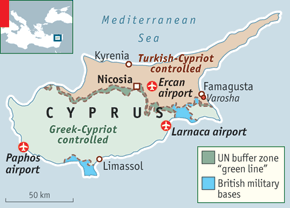Greek Cypriot Leader Anastasiades seem to be playing Russian Roulette, just like Makarios did in the pre 1974 days.
Russian naval exercises in the eastern mediterranean are no good omen for the already heated region! Particularly considering that Anastasiades has left the peace negotiations, this can only be seen as an adventure which can only bring further disasters to Cyprus.
Greek Cypriot Leader Anastasiades with Vladimir Putin
RUSSIA’s decision to hold navy exercises in waters east of the island on Monday, the same day Turkey intends to send its seismic research vessel into Cypriot offshore blocks, is no coincidence, government spokesman Nicos Christodoulides said yesterday.
Speaking to the public broadcaster from Milan, Christodoulides said: “Nothing is by chance in politics.”
He made the comments after President Nicos Anastasiades met Russian President Vladimir Putin late on Thursday on the sidelines of the Asia-Europe Meeting (ASEM) in Milan.
The two leaders sat next to each other for two hours during an official dinner for visiting heads of state and government, hosted by the Italian President, current rotating head of the EU Presidency.
According to Christodoulides, the two men had an extensive discussion on EU-Russia relations, bilateral relations and the Cyprus problem, with emphasis on Turkey’s decision to issue a NAVTEX reserving large swathes of Cyprus’ Exclusive Economic Zone (EEZ) for seismic studies, resulting in Anastasiades suspending peace talks.
“President Putin reaffirmed the Russian position of principle with regard to both the solution of the Cyprus problem and the inalienable right of the Republic of Cyprus to exploit its natural resources within its EEZ, and characterised any violation of the sovereign rights of the Republic of Cyprus as unacceptable,” said the spokesman in a written statement.
Speaking later to CyBC, the spokesman said the two leaders had a “very good discussion”. Putin was well aware of what was going on in Cyprus’ EEZ regarding Turkey’s unprecedented decision to announce seismic research and possible drilling south of Cyprus, in blocks already licenced to Italian-Korean consortium ENI-KOGAS.
“He knew about the positions of Nicosia within the EU regarding discussions on sanctions against Russia,” said Christodoulides, in reference to Cyprus’ efforts to dampen enthusiasm for wide-reaching sanctions against Moscow within the European Council over its activities in eastern Ukraine.
The two leaders agreed to stay in contact, said the spokesman, adding that a lot of discussion was had at a European level with Russia on relations between the two sides.
“Moscow recognises the constructive and balanced role played by Cyprus. So, we will see the developments within that framework, and then depending, proceed with an exchange of visits,” between Anastasiades and Putin, said Christodoulides.
The four-day Russian navy drills will be taking place inside the Nicosia Flight Information Region (FIR) in a reserved area stretching from off Cape Apostolos Andreas in the occupied northeastern tip to the coast of Syria.
“We were informed from the first moment by the Russian side. We’re talking about the Nicosia FIR, so the Cyprus Republic had to be informed.”
A joint Cyprus-Israel search and rescue exercise in Cyprus’ FIR is also scheduled for next Tuesday.
The seating arrangements at the Milan dinner will likely become the subject of much discussion back home, as the president’s relations with Moscow have recently come under heavy fire from opposition parties.
According to reports, the government actively sought a meeting with Putin at the summit.
Anastasiades came under a barrage of criticism last week for his Westpolitik – realignment of foreign policy to sit unreservedly in the ranks of the west, particularly under the leadership of the United States. Opposition parties argued this came at the expense of traditional relations with Moscow, which has always been willing to help Cyprus change the odd word or sentence in a UN Security Council Resolution, or even use its veto.
Condemnation from the opposition heightened after the US issued a lukewarm response to Turkey’s stated intention to search and drill for gas south of the island, off the Limassol coastline.
The government may have pointed to diplomatic activity taking place behind the scenes, but the presidential palace’s disappointment was palpable at the lack of firm vocal support from the US.
It’s likely that the ongoing siege by Islamic State forces against Syrian Kurds in Kobani, and Ankara’s calculated game of brinkmanship regarding possible intervention, depending on the establishment of a safety zone and no-fly zone in north Syria, has been the US State Department’s main priority at present.
The announcement of the Russian naval exercise would have given the Cypriot government something tangible to present to the public, however, since beyond its bark, Nicosia has little to bite with.
It remains to be seen whether dinner with Putin marks a return to the island’s traditional Ostpolitik or whether Anastasiades will ride the storm and continue investing in a future under the umbrella of western influence.
ON THE sidelines of the ASEM Summit, Anastasiades also held separate meetings yesterday with European Council President Herman Van Rompuy and Italian Prime Minister Matteo Renzi.
Discussion focused on Turkey’s intention to violate Cyprus’ sovereign rights at a time when ENI-KOGAS is in the process of drilling in its offshore block 9 concession.
During the meetings, Cyprus’ sovereign rights were reaffirmed, as was the need for uninterrupted drilling within its EEZ.
The spokesman said all the president’s interlocutors responded very positively. “Nobody can justify Turkey’s intentions. More so for those states that have particularly sensitivities in the eastern Mediterranean. They are more concerned than Scandinavian countries, you can understand why, because there is more concern in our region regarding Turkey’s intentions.”
Küfi Seydali




